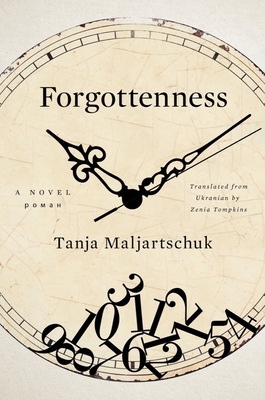Book Review of Forgottenness by Tanja Maljarschuk trans Zenia Tompkins
Name of Book: Forgottenness
Author: Tanja Maljartschuck trans Zenia Tompkins
ISBN: 978-1-324-09322-0
Publisher: Liveright
Type of book: Ukraine, agoraphobia, mental illness, 1900s, 2010s, men vs women identitifiers, marriages, loves, politics, history, death, recovering memories
Year it was published: 2024
Summary:
From one of Ukraine’s most prolific contemporary authors comes this profound novel of belonging and uprootedness, as understood by two exiles across time. Winner of the BBC Ukrainian Book of the Year Award and the German Usedom Prize, Forgottenness movingly―and unflinchingly―illuminates the intricacies of the Ukrainian experience in the twentieth and twenty-first centuries. An exceedingly anxious young narrator grapples with a host of conditions, from obsessive-compulsive disorder and alcoholism to a creeping sense of agoraphobia. As her symptoms deepen, she finds unexpected solace and companionship in researching the historical figure of Viacheslav Lypynskyi (1882–1931), a social and political activist of Polish descent who played a pivotal role in the struggle for Ukrainian independence―and just so happened to struggle with hypochondria. Through a series of mesmerizing digressions, the narrator’s own family saga is told in parallel with Lypynskyi’s, culminating in “an impressively sincere self-inquiry about identity”?(Jury of the Usedom Prize, led by Olga Tokarczuk). Shot through with wry humor and brilliantly translated by Zenia Tompkins, this urgent work announces Tanja Maljartshuk as a major voice in world literature.
Characters:
Main characters are Viacheslav as well as the female narrator. A lot of information is given about Viacheslav, such as his origins, his attempts to define and unify Ukrainian culture through writings and treatises and what it means when one sacrifices for nation rather than family. Viacheslav is extremely passionate, resourceful, charismatic and loyal. The female narrator is best described as a writer, very confused and extremely obsessed as well as suffering from agoraphobia. She also focuses on her love life and a bit on family history as something that makes up her identity ( I also should mention that what defines Viacheslavs identity are politics and Ukraine. Perhaps a nod towards what traditionally defines men and women?)
Theme:
What is identity?
Plot:
The story is told in first and third person narrative and is a dual timeline that takes place in modern times and back in 1900s. We meet an unnamed female narrator who is a writer and suffers from agoraphobia ( one can't help but wonder if the time is after 2020 when COVID-19 calmed down a bit) because on further reflection it shares a lot with few COVID novels I read ( obsession with historical figures, very little exploration of the present and focus on the past.) In third person narrative the readers meet a Polish born man named Waclaw Lipinski ( Viacheslav Lypynskyi) who decided to abandon his birth name and culture and enmesh himself through body and soul into Ukraine. Most of the novel is exploration of Viacheslavs life, from college years to his death as well as things he had done and stood for.
Author Information:
( From goodreads)
Tania Maliarchuk began with several volumes of short stories and novellas: Adolfo's Endspiel, or A Rose for Liza (2004), From Top to Bottom: A Book of Fears (2006), How I Became a Saint (2006), To Speak (2007), and Zviroslov (2009). Her first novel, Biography of an Accidental Miracle, was published in 2012.
Maliarchuk has been writing in German since 2014. In 2018 she won the Ingeborg Bachmann Award for Frösche im Meer (Frogs in the Sea), an unpublished text she read at the Festival of German-Language Literature.
Her Ukrainian work has been translated into German since 2009 (Neunprozentiger Haushaltsessing, Biografie eines zufälligen Wunders, both by Residenz Verlag). Some has also been translated into English.[2][3] The short story "Me and My Sacred Cow" was published in Best European Fiction 2013, edited by Aleksandar Hemon.[4]
Tania Maliarchuk lives in Vienna.
Maliarchuk has been writing in German since 2014. In 2018 she won the Ingeborg Bachmann Award for Frösche im Meer (Frogs in the Sea), an unpublished text she read at the Festival of German-Language Literature.
Her Ukrainian work has been translated into German since 2009 (Neunprozentiger Haushaltsessing, Biografie eines zufälligen Wunders, both by Residenz Verlag). Some has also been translated into English.[2][3] The short story "Me and My Sacred Cow" was published in Best European Fiction 2013, edited by Aleksandar Hemon.[4]
Tania Maliarchuk lives in Vienna.
Opinion:
Although quite fascinating, I definitely think I had a difficult time in understanding what this novel is about, or what it is trying to impart. But I definitely feel that this questions identity and culture when there is so little that exists. What kind of identity does one craft when one isn't given a chance to craft one? This isn't something that I ever read or thought or even explored in other novels. I definitely liked learning the beginnings of Ukranian culture and history ( in Russian Ukraine is often referred to as Little Russia despite the fact it existed way before Moscow was settled...)
This was given for review
4 out of 5
(0: Stay away unless a masochist 1: Good for insomnia 2: Horrible but readable; 3: Readable and quickly forgettable, 4: Good, enjoyable 5: Buy it, keep it and never let it go.)

Comments
Post a Comment